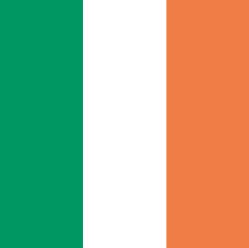
 The 32 counties within the island of Ireland are divided between the 26 counties in the Republic of Ireland and 6 in Northern Ireland.
The 32 counties within the island of Ireland are divided between the 26 counties in the Republic of Ireland and 6 in Northern Ireland.
Dublin serves as the capital of the Republic of Ireland and Belfast being Northern Ireland’s major city. The population of the Republic of Ireland is around 4.6 million and circa 1.8 million in the North. The island is served by a number of ferry operators including Stena Line, P&O, Irish Ferries and Seatruck Ferries from UK West Coast ports of Cairnryan in Scotland, Heysham, Liverpool and Birkenhead in North West England, Holyhead on Angelsey, North Wales and the South Wales ports of Pembroke and Fishguard. Ports of entry in Ireland are Larne, Belfast and Warrenpoint in the North and Dublin and Rosslare in the South. Ferry operators also serve Ireland from Cherbourg and Roscoff in France, Zeebrugge in Belgium and Rotterdam in the Netherlands. Services also run from Ireland to Gijon/Saint Nazaire.
The Republic of Ireland joined the European Union in 1973 and is a member of the European Eurozone whilst Northern Ireland remains part of the United Kingdom with the British Pound Sterling as legal tender.
Driver Requirements
Couriers, van operators truck and lorry drivers should be aware that when travelling to the Republic of Ireland it is recommended, for security reasons, that you should carry a full passport, appropriate driving licenses, a letter of authority to drive the vehicle and for non EU drivers of EU registered vehicles driver attestation is required. For drivers of vehicles over 3.5 tonnes EU driver’s hours and records rules are applicable.
With respect to vehicles the following are necessary. You are required to have a green card insurance certificate, original vehicle registration documents, vehicle nationality plate on the rear of the vehicle and a customs issued temporary importation permit displayed in the window screen.
Foreign registered vehicles are not subjected to any transit taxes although tolls are payable on some motorways, bypasses and tunnels such as the M1, M50, M3, N4-N6, Dundalk Bypass and the Dublin Port Tunnel. Road tolls on the M50 around Dublin cannot be paid for in cash and require electronic payment via www.eflow.ie or on tel. 00 353 1 890 501050. Further details on all the toll roads and charges that are applicable can be found at www.nra.ie.
Vehicle Restrictions
Unlike much of Continental Europe where vehicle heights are restricted to 4m, the Republic of Ireland has a 4.65m height restriction which is the height restriction of the Dublin Port Tunnel. Any loads exceeding 18.75m long, 4.65m high, 2.55m wide or 44 tonnes in weight for a 5/6 axle configuration (reduced to 38 tonnes for 5 axle (2 + 3) road friendly suspension) require special authorisation permits.
Applications for such permits can be made to each local authority that the vehicle is travelling through. Four days notice is required and must be submitted to :
Siochana Operations (Traffic)
Garda National Traffic Bureau
Phoenix Park
Dublin 8
Tel. 00 353 1 666 1792/1954
Email: traffic@garda.ie
The carriage of dangerous goods in convened into Irelands own national legislation. For further clarification contact N.A.O.S.H. (National Authority for Occupational Safety and Health) on 00 353 1 662 0400. The carriage of dangerous goods through the Dublin Port Tunnel is also restricted and a full safety guide can be viewed at www.dublinporttunnel.ie.
Speed Limits
Driving speed limits in the Republic of Ireland vary depending on the type of road and the size of vehicle. In the main built up areas have a speed restriction of 50km/h whilst two lane local/regional roads, National Roads and motorways have an upper limit of 80km/h. On such roads outside built up areas vehicles under 3.5 tonnes g.v.w. i.e. cars and courier vans can travel at 100km/h and up to 120km/h on motorways. Heavy Goods Vehicles (HGVs) cannot travel in the outside lane of motorways. Speed limits are rigorously enforced and speed radar traps are commonplace.
Driving Restrictions
No driving restrictions apply at weekends or on Public Holidays – (New Year’s Day, St Patricks Day 17th March, Good Friday, Easter Monday, May holiday, June holiday and August holiday (first Monday of the months), October holiday (last Monday of the month) Christmas Day and St. Stephens Day – 26th December).
Commercial vehicles cannot deliver in the centre of Dublin City between 07.00 and 10.00 hours and between 12.30 and 19.00 hours except at dedicated loading bays. Online permits need to be applied for if vehicles have five or more axles and are delivering into the central areas of Dublin. Further details can be found at www.dublincity.ie. This only applies to heavy goods vehicles and therefore is not relevant to couriers, van or lorry drivers.
Drivers should also be aware that the use of mobile phones (unless in hands-free mode) is prohibited, warning triangles must be carried but there is no snow chain or winter tyre legislation in force. Whilst not compulsory it is recommended that a warning triangle and visibility vests are carried in the vehicle.
Should you require to contact the emergency services, Police Fire or Ambulance services, whilst in the Republic of Ireland you can dial either 999 or 112.
Should you require further or more detailed information the following contacts may be of use:
Irish Ministry of Transport: info@transport.ie
Irish Freight Transport Association: info@ftai.ie
Irish Road Haulage Association: info@irha.ie



 United Kingdom
United Kingdom Republic of Ireland
Republic of Ireland Polska
Polska România
România Republica Moldova
Republica Moldova Российская Федерация
Российская Федерация Украина
Украина Республика Беларусь
Республика Беларусь Литва
Литва Латвия
Латвия Эстония
Эстония Deutschland
Deutschland Schweiz
Schweiz Österreich
Österreich Lichtenstein
Lichtenstein Belgien
Belgien Luxemburg
Luxemburg Magyarország
Magyarország Česká republika
Česká republika Slovenská republika.
Slovenská republika. España
España Italia
Italia Bulgaria
Bulgaria









